Key takeaways:
- Understanding differing religious beliefs involves shared experiences and connecting on core emotions, such as hope and love.
- Religious education fosters tolerance, empathy, and a safe space to explore complex issues of faith and belief.
- Active listening and seeking common ground are essential strategies for respectful dialogue and cooperation among diverse beliefs.
- Personal stories and vulnerability can break down barriers, revealing shared values that unite despite differing beliefs.
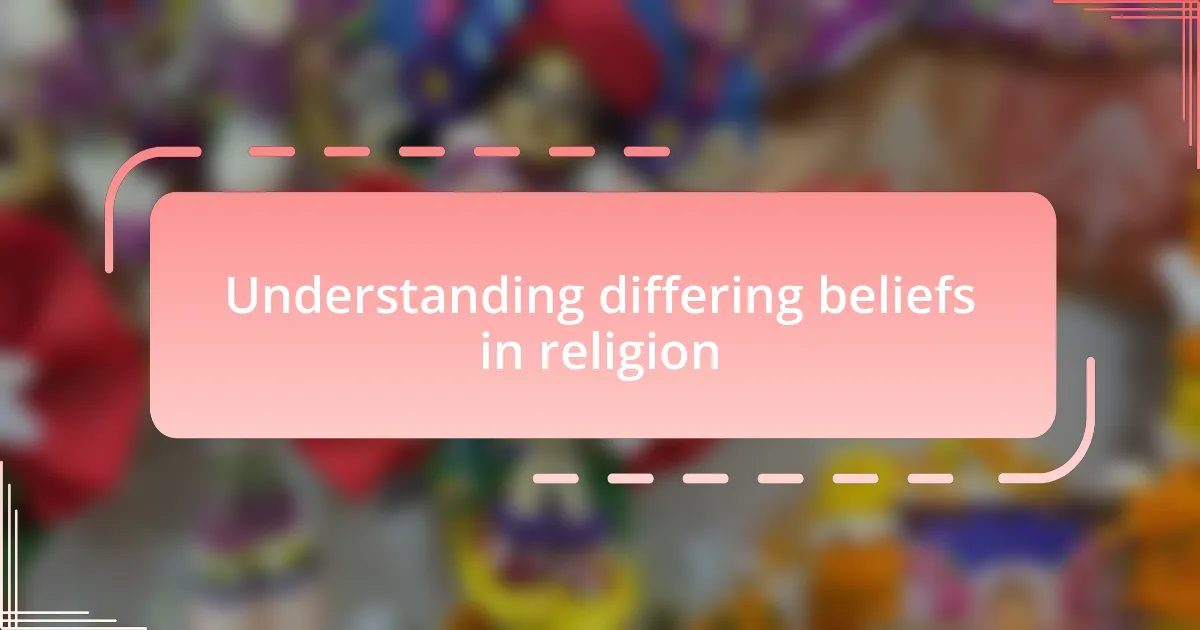
Understanding differing beliefs in religion
Understanding the nuances of differing religious beliefs requires an open heart and mind. Reflecting on my experiences, I remember a time when a close friend shared their spiritual journey that diverged sharply from my own. It prompted me to ask myself: how can we find common ground in our differences?
As I navigated various discussions on faith, I found that understanding often comes from shared experiences rather than dogmatic theories. I recall a debate in a community forum where several perspectives clashed, yet what struck me was how, amid disagreements, everyone still felt the same core emotions—hope, fear, love, and a desire for meaning. Isn’t it interesting how our different paths can lead us to similar destinations in the end?
Often, I wonder if we truly grasp the depth of others’ beliefs. For instance, I once attended a service at a mosque, which opened my eyes to practices that seemed foreign yet carried profound significance to those who participated. This experience taught me that while beliefs may differ, the underlying search for connection and understanding binds us all.
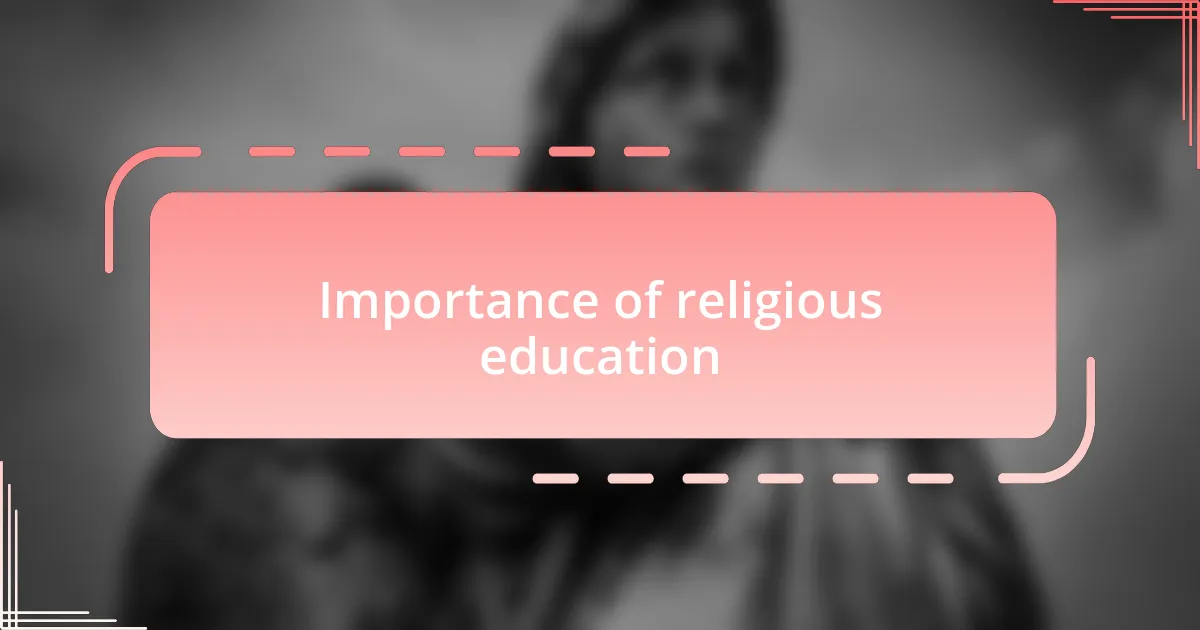
Importance of religious education
Religious education plays a crucial role in fostering tolerance and understanding. I recall attending a workshop where diverse religious educators came together to share their teachings. It was enlightening to see how each perspective contributed to a richer dialogue, making me realize that learning about different beliefs can help dissolve preconceived notions.
Through my own journey, I’ve seen how religious education encourages individuals to critically engage with their beliefs while respecting those of others. I vividly remember a moment during a community class when a participant shared their struggle with faith after experiencing loss. This openness sparked a deep conversation, illustrating how religious education can be a safe space to explore life’s complexities together.
Moreover, religious education serves not just to inform, but to connect us to deeper values. I once volunteered at a center that taught young people about various religions. Watching those students develop empathy and curiosity about one another was powerful. It reinforced my belief that by understanding our differences, we can create a more harmonious society. Are we not all searching for meaning in one way or another?
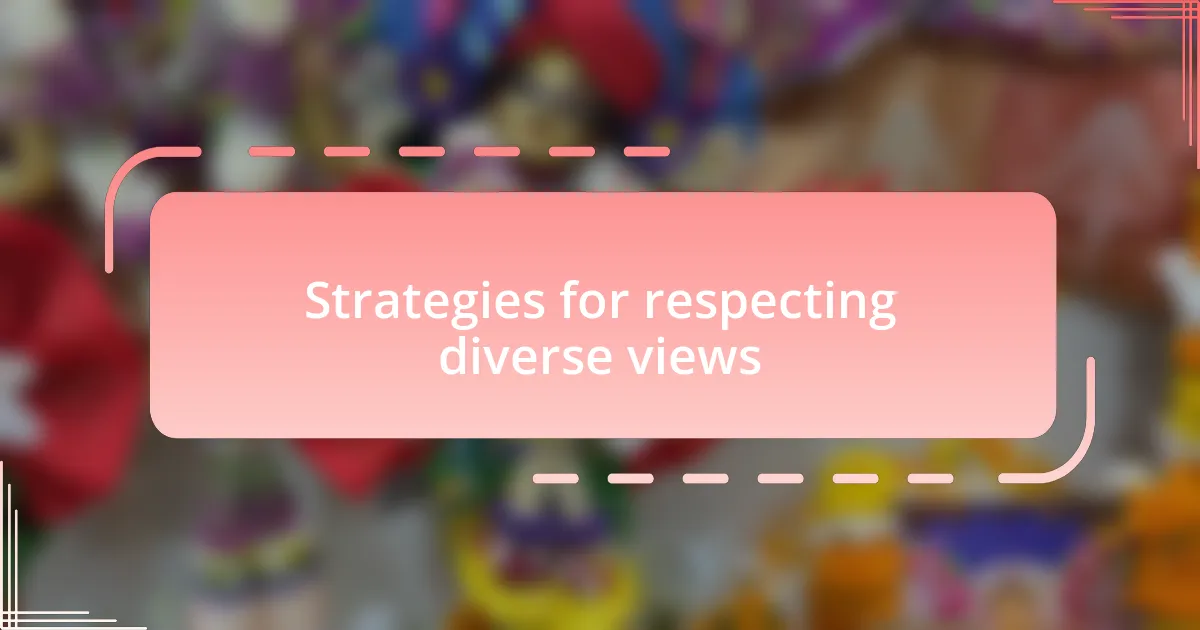
Strategies for respecting diverse views
When engaging with diverse beliefs, active listening is paramount. I remember attending a discussion group where participants were encouraged to share their thoughts without interruption. This approach transformed the atmosphere into one of mutual respect, where everyone felt valued. It made me wonder, how often do we give ourselves the space to truly hear someone else’s view?
Another effective strategy is to seek common ground. I once joined a multi-faith community service project, where individuals from various religious backgrounds came together to help those in need. As we collaborated, the conversations around our diverse beliefs flowed naturally, revealing shared values like compassion and service. It made me reflect: isn’t it fascinating how shared actions can bridge even the widest of divides?
Lastly, embracing curiosity can open doors to understanding. I find that asking open-ended questions about someone else’s beliefs encourages deeper dialogue. For instance, when a friend shared her experiences with her faith journey, I asked her what inspired her the most about it. Her insightful response not only enriched my understanding but also built a connection based on respect and shared learning, which is something I believe we can all strive for in our interactions.
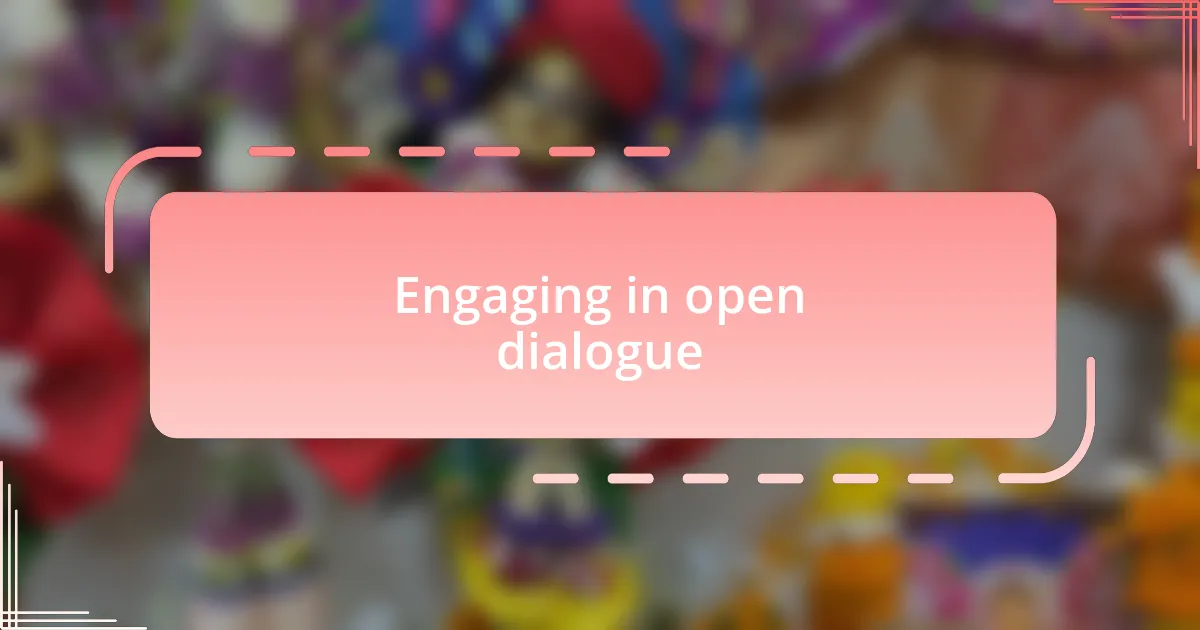
Engaging in open dialogue
Engaging in open dialogue requires us to be willing to step outside our comfort zones. I recall a time when I participated in a forum about differing faith perspectives. The discussion initially felt awkward, but as we opened up about our beliefs, I realized that vulnerability fosters connection. Doesn’t it amaze you how sharing our uncertainties can create a safe space for others to do the same?
Active participation is equally crucial in these conversations. I often reflect on a dinner conversation I had with friends from diverse backgrounds. By inviting each person to share their views on a given topic, we created an environment where everyone felt empowered to express themselves. I found joy in witnessing how these varying perspectives enriched our understanding, sparking questions that challenged my own beliefs. Have you ever noticed how much more we learn when we genuinely engage with one another?
Lastly, it’s essential to approach these dialogues without the need to “win” an argument. I remember a lively debate I had with a colleague about the role of religion in modern society. Rather than trying to convince her I was right, I focused on understanding her viewpoint. The result was enlightening! This experience taught me that embracing differing beliefs can not only expand our own horizons but also build relationships grounded in respect and empathy. Isn’t that what we ultimately seek in our discussions?
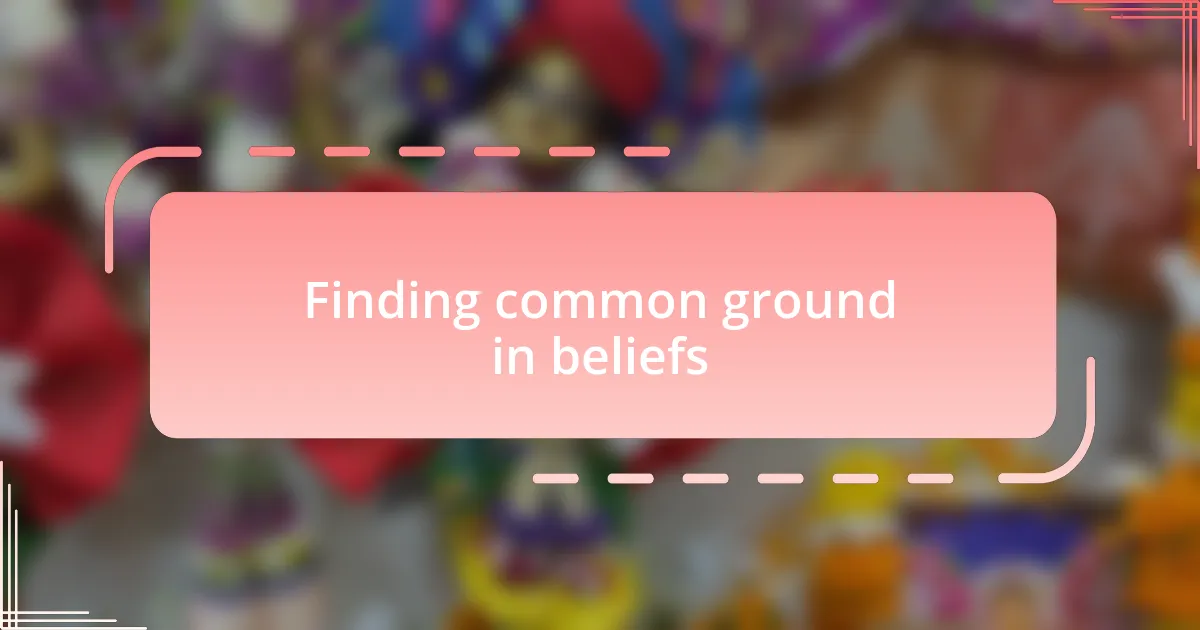
Finding common ground in beliefs
Finding common ground often starts with recognizing our shared values. I once attended a community event where different religious groups shared their traditions. Despite the varied beliefs, I found that everyone valued kindness and compassion. Isn’t it fascinating how these universal principles can unite us, even amidst our differences?
I remember a conversation I had with a neighbor who practices a different faith. Initially, we tiptoed around our beliefs, but as we discovered our mutual commitment to peace and community service, the dialogue flowed more easily. It was a poignant reminder that while our doctrines may differ, our aspirations for a better world often align. Have you ever experienced that moment when you realize you care about the same things, regardless of different beliefs?
Exploring shared experiences can also bridge gaps between differing beliefs. I’ve found that participating in local volunteer projects with people from various faith backgrounds helps to foster understanding. Working side by side, we became partners in service rather than opponents in debate. How often do we miss the opportunity to connect because we focus too much on what divides us?
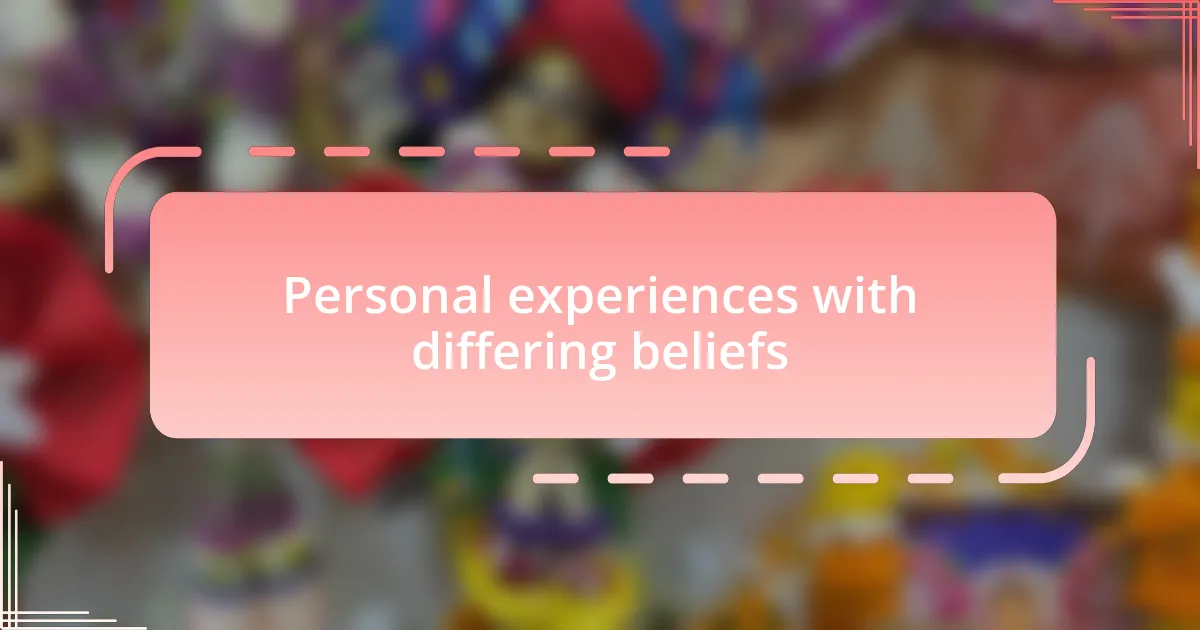
Personal experiences with differing beliefs
In my own journey, I’ve encountered moments that truly challenged my perspectives. When I attended a multi-faith retreat, I found myself in discussions that were both enlightening and uncomfortable. I recall one person passionately sharing their belief that contradicted my own views. Instead of feeling defensive, I felt curious. What if I could learn something valuable from their experiences? It was a turning point for me—embracing difference instead of shying away from it opened up new pathways for understanding.
One memory stands out vividly. At a family gathering, a relative shared their newfound belief that diverged significantly from my upbringing. The initial tension in the room was palpable, but as each person had their turn to speak, I noticed a remarkable shift. We moved from rigid arguments to sharing stories about how our beliefs shaped our identities. In that moment, I understood that differing beliefs can be a source of rich narratives rather than conflict. Have you ever found that sharing personal stories reveals more commonality than you thought?
I’ve also learned that being vulnerable can be powerful. I once hesitated to express my own doubts about certain traditions within my faith during a group discussion. Yet, when I finally did, others began to open up about their own uncertainties. It felt like pulling back a curtain, revealing the shared human experience beneath our diverse beliefs. How often do we let fear of judgment hold us back from genuine connection? By being authentic, we can create an atmosphere where differing beliefs become a catalyst for deeper understanding rather than barriers.
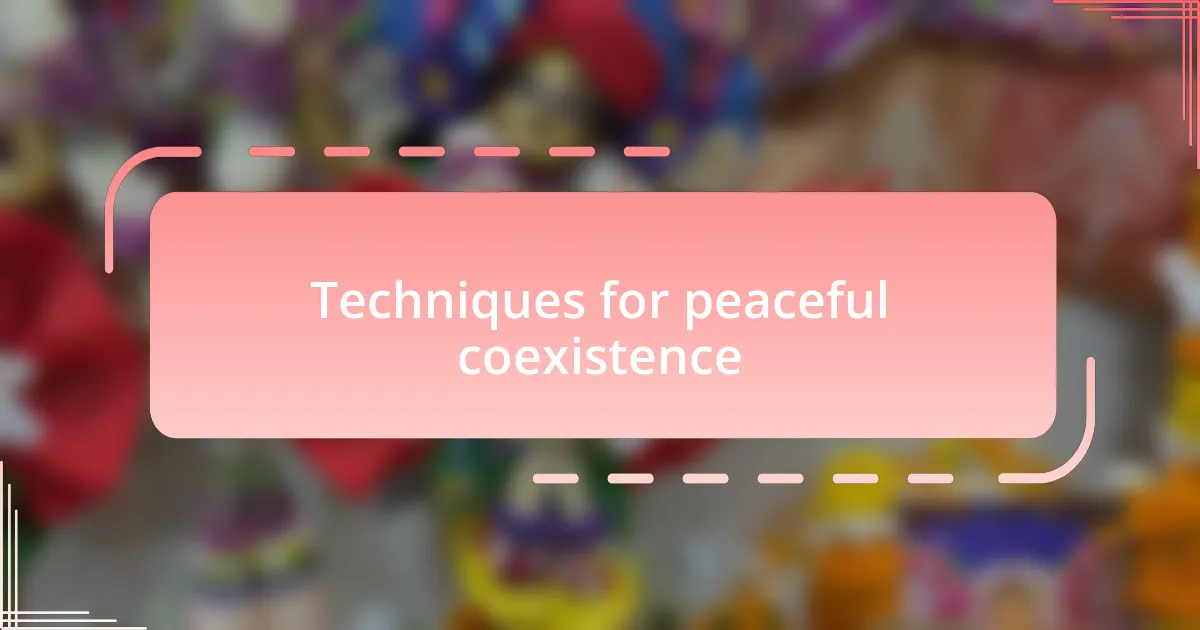
Techniques for peaceful coexistence
Engaging in open dialogue is one of the most effective techniques for peaceful coexistence. I remember attending a community event where we divided into small groups to discuss our beliefs. Initially, I felt hesitant, wondering how my views would be perceived. However, as we shared our thoughts, I found that listening—truly listening—allowed me to connect with others on a human level. It became clear that our differing beliefs didn’t have to divide us; they could encourage rich, meaningful conversations.
Another strategy that has resonated with me is finding common ground. I once participated in a project aimed at addressing community issues, which included people from various religious backgrounds. Instead of focusing on our differences, we channeled our energy into shared goals. This project not only fostered collaboration but also built friendships. I often think, wouldn’t we all benefit from focusing more on what unites us rather than what sets us apart?
Practicing empathy is essential as well. I vividly recall hosting a discussion circle where participants shared their personal experiences about faith and doubt. A participant spoke about feeling isolated in their beliefs, and my immediate instinct was to offer compassion rather than debate. This approach fostered trust among us. Have you ever noticed how vulnerability can create a safe space? That moment underscored for me the importance of understanding others’ feelings. By approaching differing beliefs with empathy, we can cultivate an environment where everyone feels valued and heard.